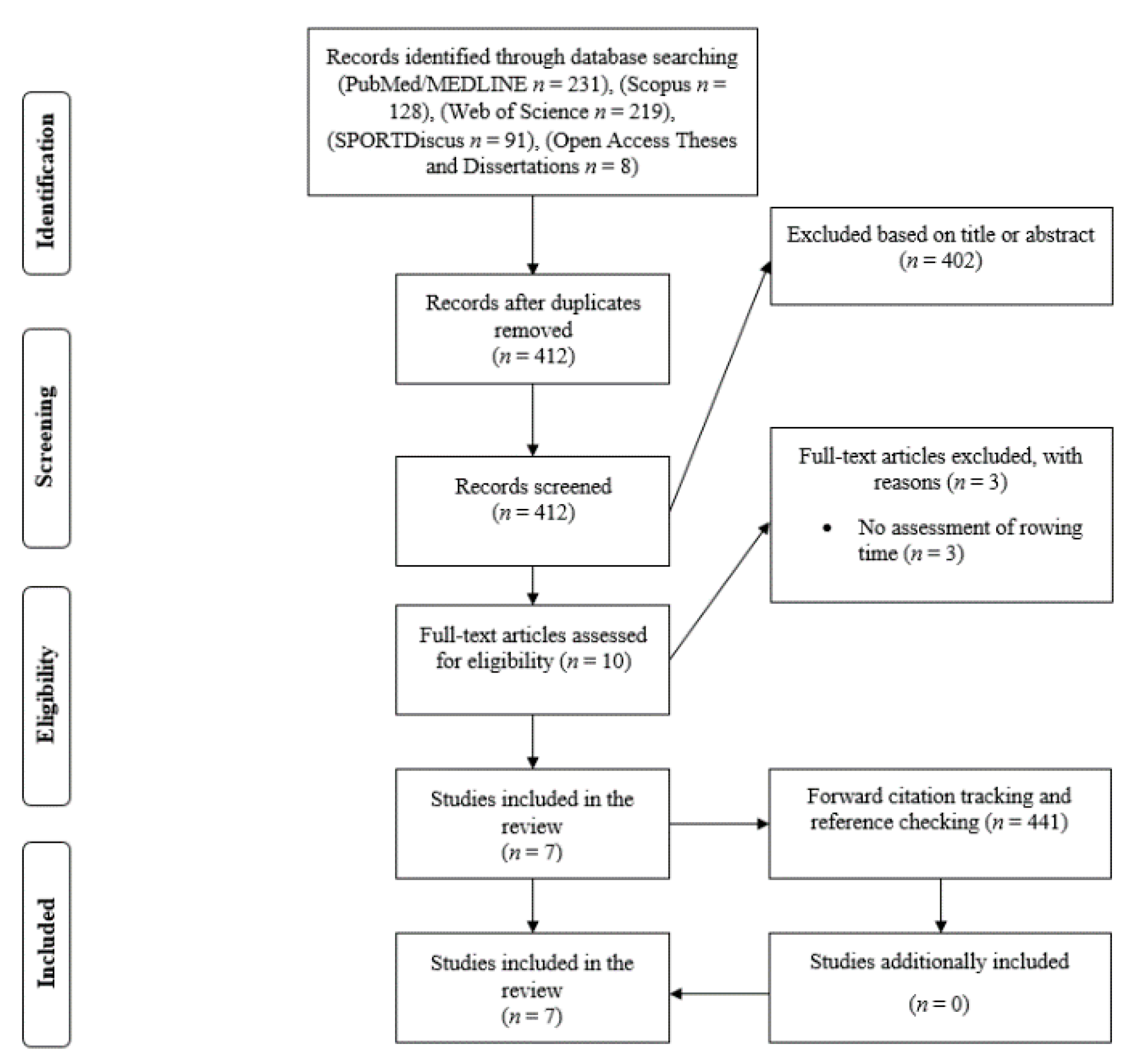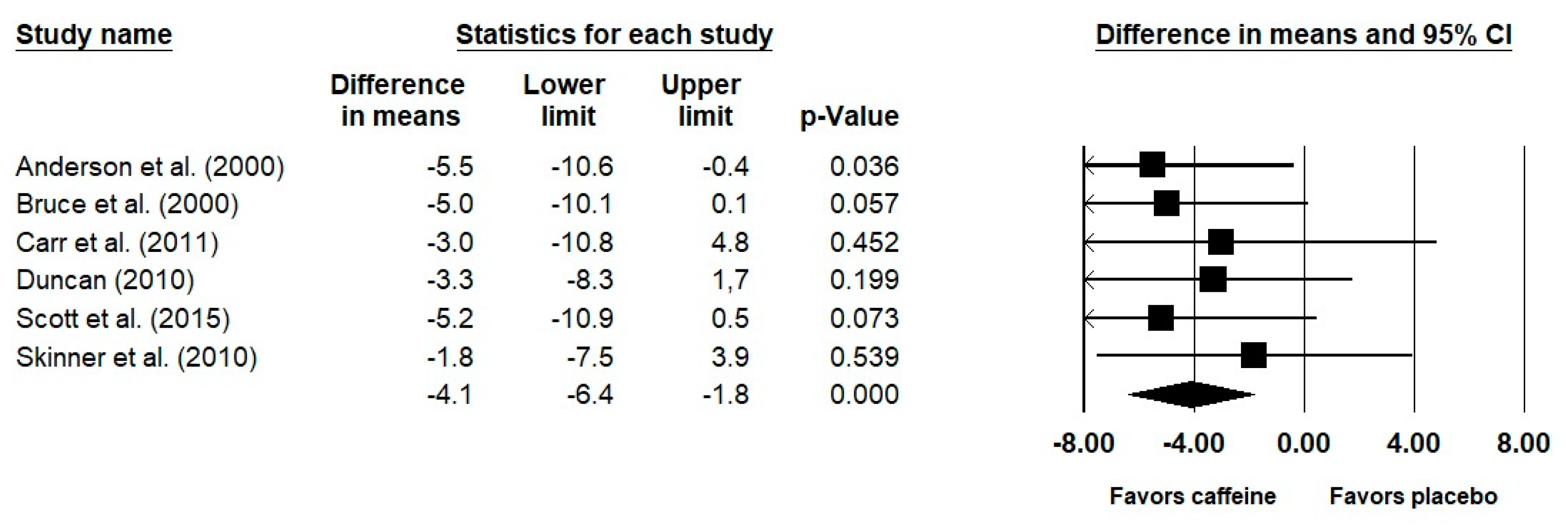The Effects of Caffeine Ingestion on Measures of Rowing Performance: A Systematic Review and Meta-Analysis
Abstract
:1. Introduction
2. Materials and Methods
2.1. Search Strategy
2.2. Inclusion Criteria
2.3. Study Coding and Data Extraction
2.4. Methodological Quality
2.5. Statistical Analysis
3. Results
3.1. Search Results
3.2. Study Characteristics
3.3. Methodological Quality
3.4. Meta-Analysis Results
4. Discussion
5. Conclusions
Author Contributions
Funding
Conflicts of Interest
References
- Graham, T.E. Caffeine and exercise: Metabolism, endurance and performance. Sports. Med. 2001, 31, 785–807. [Google Scholar] [CrossRef] [PubMed]
- McLellan, T.M.; Caldwell, J.A.; Lieberman, H.R. A review of caffeine’s effects on cognitive, physical and occupational performance. Neurosci. Biobehav. Rev. 2016, 71, 294–312. [Google Scholar] [CrossRef] [PubMed] [Green Version]
- Grgic, J.; Grgic, I.; Pickering, C.; Schoenfeld, B.J.; Bishop, D.J.; Pedisic, Z. Wake up and smell the coffee: Caffeine supplementation and exercise performance-an umbrella review of 21 published meta-analyses. Br. J. Sports. Med. 2019. [Google Scholar] [CrossRef] [PubMed]
- Del Coso, J.; Muñoz, G.; Muñoz-Guerra, J. Prevalence of caffeine use in elite athletes following its removal from the World Anti-Doping Agency list of banned substances. Appl. Physiol. Nutr. Metab. 2011, 36, 555–561. [Google Scholar] [CrossRef] [PubMed] [Green Version]
- Aguilar-Navarro, M.; Muñoz, G.; Salinero, J.J.; Muñoz-Guerra, J.; Fernández-Álvarez, M.; Plata, M.D.M.; Del Coso, J. Urine Caffeine Concentration in Doping Control Samples from 2004 to 2015. Nutrients 2019, 11, 286. [Google Scholar] [CrossRef] [PubMed] [Green Version]
- Skinner, T.L.; Jenkins, D.G.; Coombes, J.S.; Taaffe, D.R.; Leveritt, M.D. Dose response of caffeine on 2000-m rowing performance. Med. Sci. Sports. Exerc. 2010, 42, 571–576. [Google Scholar] [CrossRef]
- Bruce, C.R.; Anderson, M.E.; Fraser, S.F.; Stepto, N.K.; Klein, R.; Hopkins, W.G.; Hawley, J.A. Enhancement of 2000-m rowing performance after caffeine ingestion. Med. Sci. Sports. Exerc. 2000, 32, 1958–1963. [Google Scholar] [CrossRef] [Green Version]
- Grgic, J. Are There Non-Responders to the Ergogenic Effects of Caffeine Ingestion on Exercise Performance? Nutrients 2018, 10, 1736. [Google Scholar] [CrossRef] [Green Version]
- Salinero, J.J.; Lara, B.; Del Coso, J. Effects of acute ingestion of caffeine on team sports performance: A systematic review and meta-analysis. Res. Sports. Med. 2019, 27, 238–256. [Google Scholar] [CrossRef]
- Turnes, T.; Cruz, R.S.O.; Caputo, F.; De Aguiar, R.A. The Impact of Preconditioning Strategies Designed to Improve 2000-m Rowing Ergometer Performance in Trained Rowers: A Systematic Review and Meta-Analysis. Int. J. Sports. Physiol. Perform. 2019, 14, 871–879. [Google Scholar] [CrossRef]
- Dankel, S.J.; Mouser, J.G.; Mattocks, K.T.; Counts, B.R.; Jessee, M.B.; Buckner, S.L.; Loprinzi, P.D.; Loenneke, J.P. The widespread misuse of effect sizes. J. Sci. Med. Sport. 2017, 20, 446–450. [Google Scholar] [CrossRef]
- Maher, C.G.; Sherrington, C.; Herbert, R.D.; Moseley, A.M.; Elkins, M. Reliability of the PEDro scale for rating quality of randomized controlled trials. Phys. Ther. 2003, 83, 713–721. [Google Scholar] [CrossRef] [Green Version]
- Grgic, J.; Trexler, E.T.; Lazinica, B.; Pedisic, Z. Effects of caffeine intake on muscle strength and power: A systematic review and meta-analysis. J. Int. Soc. Sports Nutr. 2018, 15, 11. [Google Scholar] [CrossRef] [Green Version]
- Grgic, J.; Pickering, C. The effects of caffeine ingestion on isokinetic muscular strength: A meta-analysis. J. Sci. Med. Sport 2019, 22, 353–360. [Google Scholar] [CrossRef]
- Grgic, J. Caffeine ingestion enhances Wingate performance: A meta-analysis. Eur. J. Sport. Sci. 2018, 18, 219–225. [Google Scholar] [CrossRef]
- Duncan, M.J. The impact of caffeine consumption on 1000-metre rowing performance. In Trends in Human Performance Research; Duncan, M.J., Lyons, M., Eds.; Nova Science Publishers Inc.: New York, NY, USA, 2011; pp. 23–34. [Google Scholar]
- Christensen, P.M.; Petersen, M.H.; Friis, S.N.; Bangsbo, J. Caffeine, but not bicarbonate, improves 6 min maximal performance in elite rowers. Appl. Physiol. Nutr. Metab. 2014, 39, 1058–1063. [Google Scholar] [CrossRef]
- Anderson, M.E.; Bruce, C.R.; Fraser, S.F.; Stepto, N.K.; Klein, R.; Hopkins, W.G.; Hawley, J.A. Improved 2000-meter rowing performance in competitive oarswomen after caffeine ingestion. Int. J. Sport. Nutr. Exerc. Metab. 2000, 10, 464–475. [Google Scholar] [CrossRef]
- Carr, A.J.; Gore, C.J.; Dawson, B. Induced alkalosis and caffeine supplementation: Effects on 2000-m rowing performance. Int. J. Sport. Nutr. Exerc. Metab. 2011, 21, 357–364. [Google Scholar] [CrossRef]
- Scott, A.T.; O’Leary, T.; Walker, S.; Owen, R. Improvement of 2000-m rowing performance with caffeinated carbohydrate-gel ingestion. Int. J. Sports Physiol. Perform. 2015, 10, 464–468. [Google Scholar] [CrossRef]
- Mäestu, J.; Jürimäe, J.; Jürimäe, T. Monitoring of performance and training in rowing. Sports Med. 2005, 35, 597–617. [Google Scholar] [CrossRef]
- Schabort, E.J.; Hawley, J.A.; Hopkins, W.G.; Blum, H. High reliability of performance of well-trained rowers on a rowing ergometer. J. Sports. Sci. 1999, 17, 627–632. [Google Scholar] [CrossRef]
- Jürimäe, J.; Jarek, M.; Jürimäe, T.; Pihl, E. Prediction of rowing performance on single sculls from metabolic and anthropometric variables. J. Hum. Mov. Stud. 2000, 38, 123–136. [Google Scholar]
- Mikulić, P.; Smoljanović, T.; Bojanić, I.; Hannafin, J.A.; Matković, B.R. Relationship between 2000-m rowing ergometer performance times and World Rowing Championships rankings in elite-standard rowers. J. Sports. Sci. 2009, 27, 907–913. [Google Scholar] [CrossRef]
- Grgic, J.; Mikulic, P.; Schoenfeld, B.J.; Bishop, D.J.; Pedisic, Z. The Influence of Caffeine Supplementation on Resistance Exercise: A Review. Sports. Med. 2019, 49, 17–30. [Google Scholar] [CrossRef]
- Sabol, F.; Grgic, J.; Mikulic, P. The Effects of 3 Different Doses of Caffeine on Jumping and Throwing Performance: A Randomized, Double-Blind, Crossover Study. Int. J. Sports. Physiol. Perform. 2019, 22, 1170–1177. [Google Scholar] [CrossRef]
- Jenkins, N.T.; Trilk, J.L.; Singhal, A.; O’Connor, P.J.; Cureton, K.J. Ergogenic effects of low doses of caffeine on cycling performance. Int. J. Sport. Nutr. Exerc. Metab. 2008, 18, 328–342. [Google Scholar] [CrossRef]
- Saunders, B.; de Oliveira, L.F.; da Silva, R.P.; de Salles Painelli, V.; Gonçalves, L.S.; Yamaguchi, G.; Mutti, T.; Maciel, E.; Roschel, H.; Artioli, G.G.; et al. Placebo in sports nutrition: A proof-of-principle study involving caffeine supplementation. Scand. J. Med. Sci. Sports 2017, 27, 1240–1247. [Google Scholar] [CrossRef]


| Reference | Study Design | Sample | Caffeine Dose | Caffeine Form | Timing of Caffeine Ingestion | Rowing Distance or Minutes of Rowing | Rowing Conditions | Time to Complete the Distance (Placebo Condition—Seconds) | Percent Change * | Reported Side-Effects from Caffeine |
|---|---|---|---|---|---|---|---|---|---|---|
| Anderson et al. (2000) | Randomized double-blind crossover | 8 competitive oarswomen (age: 22 ± 3 years; body mass: 64 ± 4 kg) | 6 and 9 mg/kg | Capsule | 60 min pre-exercise | 2000 m | Concept II rowing ergometer | 479 ± 15 | 6 mg/kg: ↑ 0.7% 9 mg/kg: ↑ 1.4% | None reported. |
| Bruce et al. (2000) | Randomized double-blind crossover | 8 competitive oarsmen ** | 6 and 9 mg/kg | Capsule | 60 min pre-exercise | 2000 m | Concept II rowing ergometer | 414 ± 15 | 6 mg/kg: ↑ 1.3% 9 mg/kg: ↑ 1.1% | None reported. |
| Carr et al. (2011) | Double-blind crossover | 8 competitive rowers (6 men and 2 women) (body mass for men: 82 ± 12 kg; body mass for women: 78 ± 6 kg) ** | 6 mg/kg | Capsule | 30 min pre-exercise | 2000 m | Concept II rowing ergometer | 403.8 ± 23.4 | ↑ 0.7% | Irregular heartbeat, increased alertness, hand tremor, and feeling hyperactive. |
| Christensen et al. (2014) | Double-blind crossover | 14 competitive rowers (11 men and 1 women) (age: 25 to 27 years; body mass for men: 92 ± 3 kg, or 75 ± 3 kg; body mass for women: 63 kg) | 3 mg/kg | Capsule | 45 min pre-exercise | 6 min rowing | Concept II rowing ergometer | n/a | ↑ 0.7% | None reported. |
| Duncan (2000) | Crossover | 12 individuals with some experience in rowing (10 men and 2 women) (age: 22 ± 3 years) ** | 5 mg/kg | Liquid | 60 min pre-exercise | 1000 m | Concept II rowing ergometer | 231.7 ± 22.6 | ↑ 1.4% | None reported. |
| Scott et al. (2015) | Randomized single-blind crossover | 13 men with some experience in rowing (age: 21 ± 2 years; body mass: 78 ± 9 kg) | 100 mg | Gel | 10 min pre-exercise | 2000 m | Concept II rowing ergometer | 471.4 ± 28.5 | ↑ 1.1% | None reported. |
| Skinner et al. (2010) | Randomized double-blind crossover | 10 competitive oarsmen (age: 21 ± 1 years; body mass: 88 ± 11 kg) | 2, 4 and 6 mg/kg | Capsule | 60 min pre-exercise | 2000 m | Concept II rowing ergometer | 403.8 ± 21 | 2 mg/kg: ↑ 0.3% 4 mg/kg: ↑ 0.7% 6 mg/kg: ↑ 0.3% | Increased alertness, difficulty sleeping, and hand tremors. |
| Reference | Item 1 | Item 2 | Item 3 | Item 4 | Item 5 | Item 6 | Item 7 | Item 8 | Item 9 | Item 10 | Item 11 | Total Score |
|---|---|---|---|---|---|---|---|---|---|---|---|---|
| Anderson et al. (2000) | No | Yes | Yes | Yes | Yes | Yes | Yes | Yes | Yes | Yes | Yes | 10 |
| Bruce et al. (2000) | No | Yes | Yes | Yes | Yes | Yes | Yes | Yes | Yes | Yes | Yes | 10 |
| Carr et al. (2011) | No | No | Yes | Yes | Yes | Yes | Yes | Yes | Yes | Yes | Yes | 9 |
| Christensen et al. (2014) | No | Yes | Yes | Yes | Yes | Yes | Yes | Yes | Yes | Yes | Yes | 10 |
| Duncan (2000) | No | Yes | Yes | Yes | No | No | No | Yes | Yes | Yes | Yes | 7 |
| Scott et al. (2015) | No | No | No | Yes | No | Yes | Yes | Yes | Yes | Yes | Yes | 7 |
| Skinner et al. (2010) | No | Yes | Yes | Yes | Yes | Yes | Yes | Yes | Yes | Yes | Yes | 10 |
© 2020 by the authors. Licensee MDPI, Basel, Switzerland. This article is an open access article distributed under the terms and conditions of the Creative Commons Attribution (CC BY) license (http://creativecommons.org/licenses/by/4.0/).
Share and Cite
Grgic, J.; Diaz-Lara, F.J.; Del Coso, J.; Duncan, M.J.; Tallis, J.; Pickering, C.; Schoenfeld, B.J.; Mikulic, P. The Effects of Caffeine Ingestion on Measures of Rowing Performance: A Systematic Review and Meta-Analysis. Nutrients 2020, 12, 434. https://doi.org/10.3390/nu12020434
Grgic J, Diaz-Lara FJ, Del Coso J, Duncan MJ, Tallis J, Pickering C, Schoenfeld BJ, Mikulic P. The Effects of Caffeine Ingestion on Measures of Rowing Performance: A Systematic Review and Meta-Analysis. Nutrients. 2020; 12(2):434. https://doi.org/10.3390/nu12020434
Chicago/Turabian StyleGrgic, Jozo, Francisco Javier Diaz-Lara, Juan Del Coso, Michael J. Duncan, Jason Tallis, Craig Pickering, Brad J. Schoenfeld, and Pavle Mikulic. 2020. "The Effects of Caffeine Ingestion on Measures of Rowing Performance: A Systematic Review and Meta-Analysis" Nutrients 12, no. 2: 434. https://doi.org/10.3390/nu12020434
APA StyleGrgic, J., Diaz-Lara, F. J., Del Coso, J., Duncan, M. J., Tallis, J., Pickering, C., Schoenfeld, B. J., & Mikulic, P. (2020). The Effects of Caffeine Ingestion on Measures of Rowing Performance: A Systematic Review and Meta-Analysis. Nutrients, 12(2), 434. https://doi.org/10.3390/nu12020434








